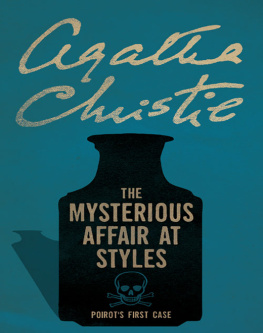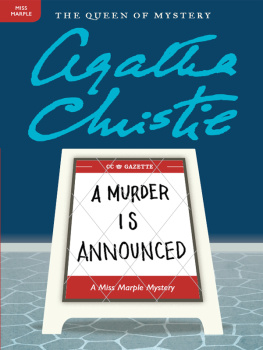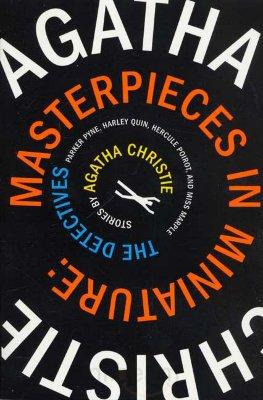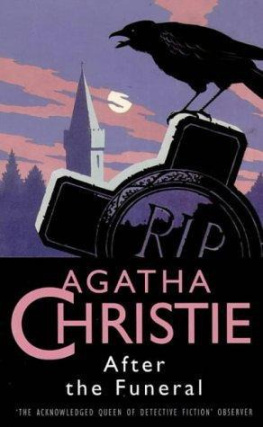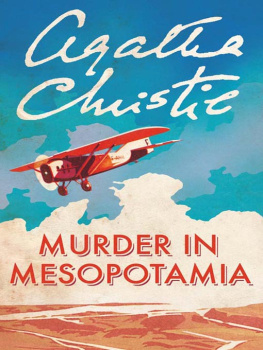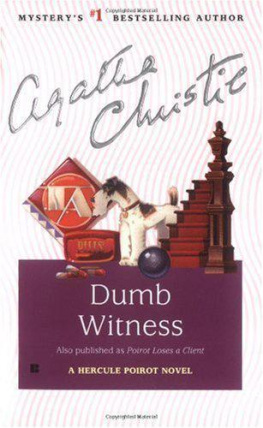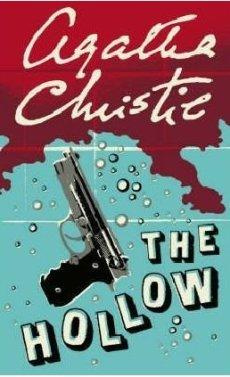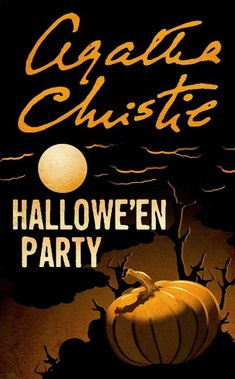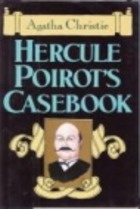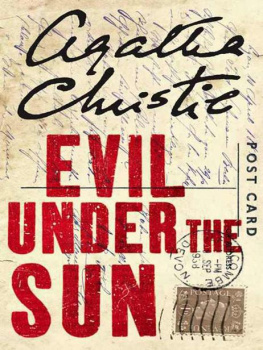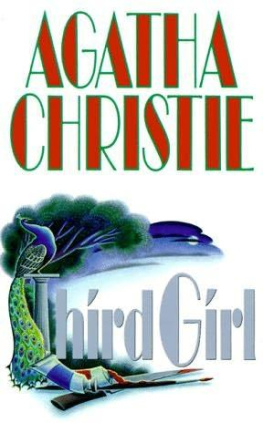Chapter 1
The flat was a modern one. The furnishings of the room were modern, too. The armchairs were squarely built, the upright chairs were angular. A modern writing-table was set squarely in front of the window and at it sat a small, elderly man. His head was practically the only thing in the room that was not square. It was egg-shaped.
M. Hercule Poirot was reading a letter:
Hamborough Close,
Hamborough St Mary,
Westshire.
Station: Whimperley.
Telegrams: Harborough St John.
September 24th, 1936.
M. Hercule Poirot,
Dear Sir,
A matter has arisen which requires handling with great delicacy and discretion. I have heard good accounts of you and have decided to entrust the matter to you. I have reason to believe that I am the victim of fraud, but for family reasons I do not wish to call in the police. I am taking certain measures of my own to deal with the business, but you must be prepared to come down here immediately on receipt of a telegram. I should be obliged if you will not answer this letter.
Yours faithfully,
Gervase Chevenix-Gore.
The eyebrows of M. Hercule Poirot climbed slowly up his forehead until they nearly disappeared into his hair.
"And who, then," he demanded of space, "is this Gervase Chevenix-Gore?" He crossed to a bookcase and took out a large, fat book. He found what he wanted easily enough:
Chevenix-Gore, Sir Gervase Francis Xavier, 10th Bt. cr. 1694; formerly Captain 17th Lancers; b. 18th May 1878; e.s. of Sir Guy Chevenix-Gore, 9th Bt. nd Lady Claudia Bretherton, 2nd d. of 8th Earl of Wallingford. S. father, 1911; m. 1912, Vanda Elizabeth, e.d. of Colonel Frederick Arbuthnot q.v.; educ. Eton. Served European War 1914-'18. Recreations: traveling, big game hunting. Address: Hamborough Close, Hamborough St Mary, Westshire, and 218 Lowndes Square, S.W.1. Clubs: Cavalry, Travelers.
Poirot shook his head in a slightly dissatisfied manner. For a moment or two he remained lost in thought, then he went to the desk, pulled open a drawer, and took out a little pile of invitation cards. His face brightened.
"A La bonne heure! Exactly my affair! He will certainly be there."
A Duchess greeted M. Hercule Poirot in fulsome tones:
"So you could manage to come after all, M. Poirot! Why, that's splendid."
"The pleasure is mine, madame," murmured Poirot, bowing.
He escaped from several important and splendid beings - a famous diplomat, an equally famous actress and a well-known sporting peer - and found at last the person he had come to seek, that invariably "also present" guest Mr Satterthwaite.
Mr Satterthwaite twittered amiably:
"The dear Duchess - I always enjoy her parties... Such a personality, if you know what I mean. I saw a lot of her in Corsica some years ago..."
Mr Satterthwaite's conversation was apt to be unduly burdened by mentions of his titled acquaintances. It is possible that he may sometimes have found pleasure in the company of Messrs. Jones, Brown or Robinson but if so, he did not mention the fact. And yet, to describe Mr Satterthwaite as a mere snob and leave it at that would have been to do him an injustice. He was a keen observer of human nature, and if it is true that the looker-on knows most of the game, Mr Satterthwaite knew a good deal.
"You know, my dear fellow, it is really ages since I saw you. I always feel myself privileged to have seen you work at close quarters in the Crow's Nest business. I feel since then that I am in the know, so to speak. I saw Lady Mary only last week, by the way. A charming creature - potpourri and lavender!"
After passing lightly on one or two scandals of the moment - the indiscretions of an Earl's daughter, and the lamentable conduct of a Viscount - Poirot succeeded in introducing the name of Gervase Chevenix-Gore.
Mr Satterthwaite responded immediately:
"Ah! now, there is a character, if you like! The Last of the Baronets - that's his nickname,"
"Pardon, I do not quite comprehend -?"
Mr Satterthwaite unbent indulgently to the lower comprehension of a foreigner.
"It's a joke, you know - a joke. Naturally, he's not really the last Baronet in England - but he does represent the end of an era. The Bold Bad Baronet - the mad harum-scarum Baronet so popular in the novels of the last century - the kind of fellow who laid impossible wagers and won 'em." He went on to expound what he meant in more detail. In younger years, Gervase Chevenix-Gore had sailed round the world in a windjammer. He had been on an expedition to the Pole; he had challenged a racing peer to a duel. For a wager he had ridden his favorite mare up the staircase of a ducal house. He had once leapt from a box to the stage, and carried off a well-known actress in the middle of her rle. The anecdotes of him were innumerable.
"It's an old family," went on Mr Satterthwaite. "Sir Guy Chevenix-Gore went on the first crusade. Now, alas, the line looks like it's coming to an end. Old Gervase is the last Chevenix-Gore."
"The estate, it is impoverished?"
"Not a bit of it. Gervase is fabulously wealthy. Owns valuable house-property - coal-fields - and in addition, he staked out a claim to some mine in Peru or somewhere in South America, when he was a young man, which has yielded him a fortune. An amazing man. Always fortunate in everything he's undertaken."
"He is now an elderly man, of course?"
"Yes, poor old Gervase." Mr Satterthwaite sighed, shook his head. "Most people would describe him to you as mad as a hatter. It's true, in a way. He is mad - not in the sense of being certifiable or having delusions - but mad in the sense of being abnormal. He's always been a man of great originality of character."
"And originality becomes eccentricity as the years go by?" suggested Poirot.
"Very true. That's exactly what's happened to poor old Gervase."
"He has, perhaps, a swollen idea of his own importance?"
"Absolutely. I should imagine that, in Gervase's mind, the world has always been divided into two parts - the Chevenix-Gores - and the other people!"
"An exaggerated sense of family!"
"Yes. The Chevenix-Gores are all arrogant as the devil - a law unto themselves. Gervase, being the last of them, has got it badly. He is - well, really, you know, to hear him talk, you might imagine him to be - er - the Almighty!"
Poirot nodded his head slowly and thoughtfully.
"Yes, I imagined that. I have had, you see, a letter from him. It was an unusual letter. It did not demand. It summoned!"
"A royal command," said Mr Satterthwaite tittering a little.
"Precisely. It did not seem to occur to this Sir Gervase that I, Hercule Poirot, am a man of importance, a man of infinite affairs! That it was extremely unlikely that I should be able to fling everything aside and come hastening like an obedient dog - like a mere nobody, gratified to receive a commission!"
Mr Satterthwaite bit his lip in an effort to suppress a smile. It may have occurred to him that where egoism was concerned, there was not much to choose between Hercule Poirot and Gervase Chevenix-Gore.
He murmured:
"Of course, if the cause of the summons was urgent -?"
"It was not!" Poirot's hands rose in the air in an emphatic gesture. "I was to hold myself at his disposition, that was all, in case he should require me! Enfin, je vous demande!" Again the hands rose eloquently, expressing better than words could do M. Hercule Poirot's sense of utter outrage.
"I take it," said Mr Satterthwaite, "that you refused?"
"I have not yet had the opportunity," said Poirot slowly.
"But you will refuse?"
A new expression passed over the little man's face. His brow furrowed itself perplexedly. He said:


